

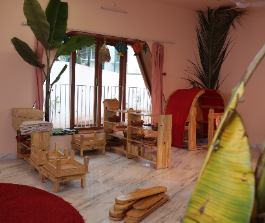

In the rush to prepare children for the world, we often forget to prepare the world for children.
At Swechha, a Waldorf school in Vizag, we believe the early years are not a holding period before ‘real’ learning begins. They are the very heart of it. A time when the world is met with wide eyes, curious hands, and an open soul. A time not to be hurried through, but held, gently, deliberately, with love.
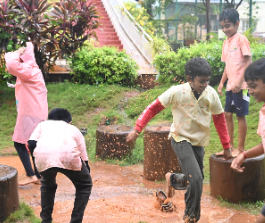

Every morning tells a story. For some children, it begins with reluctance: a slow shuffle from bed to bus, the school day feeling like a duty. For others, it begins with eagerness: eyes bright, feet quick, voices humming with anticipation. At Swechha, we believe that school should be a place children love to go, not because they must, but because it feels like an extension of their world, a place where curiosity is welcomed, friendships flourish, and learning feels alive.
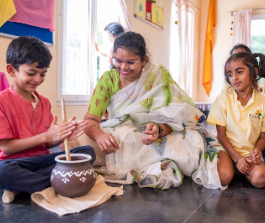

In the earliest years of life, a child’s mind is not just ready to absorb information, it is ready to experience the world. Every moment, every gesture, every small task becomes a way to understand life more deeply. Yet in a hurried world, we often confuse learning with instruction and achievement with competition. At Swechha, we believe that early childhood education is not about rushing children into academics, but about nurturing in them something far more enduring: a genuine love of learning in children.
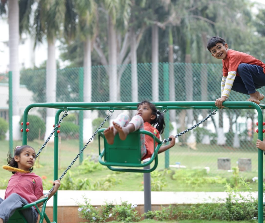

In the Waldorf approach, especially in the tender years of Kindergarten, movement is the foundation upon which a child’s physical, emotional, and cognitive life is built. It is how they understand the world before they can describe it. It is how they express what they feel before they know how to name it. Movement, in essence, is the child’s first language.
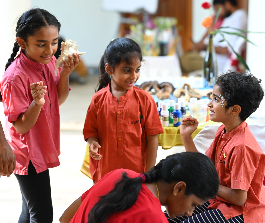

In a culture that celebrates achievement by speed, quantifiable grades, and relentless comparison, the gentle rhythm of Waldorf education can feel unfamiliar—even unsettling. Especially for parents in India exploring alternatives to mainstream academics, questions surface: Does the Waldorf approach slow down my child? Will they fall behind? Are they prepared for a competitive world?
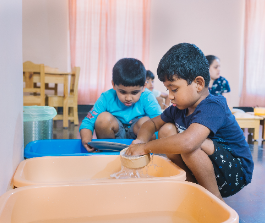

Raising children is one of life’s most rewarding and complex journeys. As parents and educators, we often wonder: When should we start teaching discipline? How can we help children become responsible without fear or pressure? The answers lie in timing, approach, and empathy.
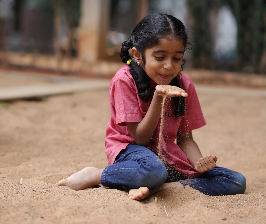

The early years of a child’s life are the foundational years both for the child and the parent. The high pace of change and growth in the first few years of a child is only matched by the steep learning curve a parent goes through. As children grow independent, articulate and strong in their preferences, parents often seek ways of engaging them in healthy ways
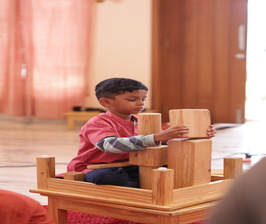

The journey of education begins long before a child holds a book or recites the alphabet. It starts in the tender years when curiosity is boundless and every moment is an opportunity to explore, question and understand. Choosing the right kindergarten is not just about selecting a school—it is about laying the foundation for a lifetime of learning, emotional resilience, and creativity.
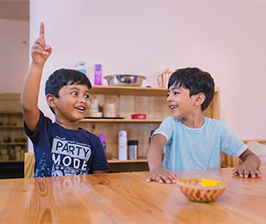

Hurried academic learning may provide the child with an abundance of knowledge at an early stage. But, this does not necessarily translate into healthy and holistic preparedness for life. It does more damage in rushing the child to learn too much too soon. Based on this understanding, Waldorf's approach to education is grounded in age appropriateness for fostering the right learning at the right time. Know more about when to begin preschool for your child and how to understand their readiness.
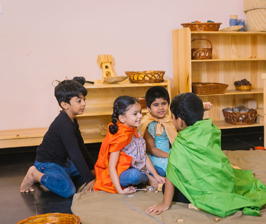

Is your child setting out on their educational journey? The holistic development of each child to realise their true potential and prepare for life is significantly founded on the journey of learning during their early years. To this end, Waldorf in preschool education nurtures the growth of children in early years with distinct elements and practices that are purposeful for their present and future. Read more to know about the right learning experiences for children that nourish their readiness for learning in the later years.
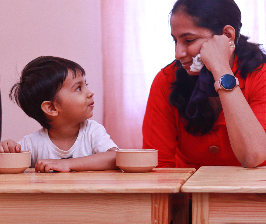

Every parent has a unique perception of the choice that is made for their child's education. Derived from the insights of Rudolf Steiner and the tenets of Waldorf education, Swechha school strives to nurture children to grow into truly free beings with perseverance to pursue their own will and be visionaries for a better world. Do you wonder why Waldorf is considered as the choice of education approach? Here's a list of reasons for a quick read on why Waldorf is chosen by millennial adults as the approach for their child's learning in the current times.
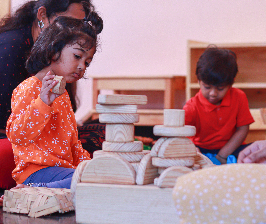

Being the first Waldorf inspired school in the city of Visakhapatnam, Swechha joins the worldwide movement of more than 1000 Waldorf schools in bringing to life a philosophy that emphasises child-centred and holistic approach to education. Are you curious to know what’s so unique about Waldorf approach to education? Here’s a glimpse into some of the hallmarks.
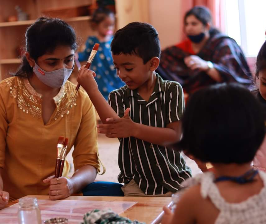

With the exponential increase in media consumption, it is imminent that screen-time is detrimental to children especially during the early years when they are still making sense of the world around them. When screen-free practices are mutually agreed and adopted multiple aspects of children’s mood and growth will reflect a noticeable change.
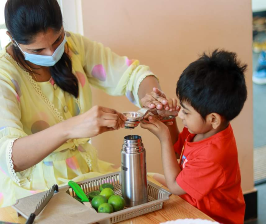

Food is associated with a variety of memories and emotions from a young age. The way it is introduced, prepared and served creates an impression in the mind of a child, which as they grow, determines their relationship with food.
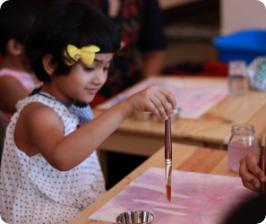

As children grow, they exhibit development and meet milestones that are not only confined to their physical growth but also social, intellectual, emotional and spiritual growth. Through their transition across stages of development it is important that all the influences and experiences of childhood need to be age-appropriate and unhurried.
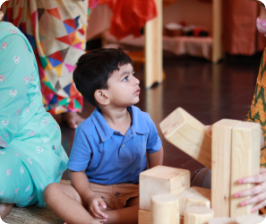

Swechha, an initiative by GITAM (deemed to be University), embraces Waldorf philosophy with a vision to introduce and inspire an alternate approach to education in Visakhapatnam. Derived from the insights of Rudolf Steiner and the tenets of Waldorf education, we strive to nurture children to grow into truly free beings with perseverance to pursue their own will and be visionaries for a better world.


In the rush to prepare children for the world, we often forget to prepare the world for children.
At Swechha, a Waldorf school in Vizag, we believe the early years are not a holding period before ‘real’ learning begins. They are the very heart of it. A time when the world is met with wide eyes, curious hands, and an open soul. A time not to be hurried through, but held, gently, deliberately, with love.


Every morning tells a story. For some children, it begins with reluctance: a slow shuffle from bed to bus, the school day feeling like a duty. For others, it begins with eagerness: eyes bright, feet quick, voices humming with anticipation. At Swechha, we believe that school should be a place children love to go, not because they must, but because it feels like an extension of their world, a place where curiosity is welcomed, friendships flourish, and learning feels alive.


In the earliest years of life, a child’s mind is not just ready to absorb information, it is ready to experience the world. Every moment, every gesture, every small task becomes a way to understand life more deeply. Yet in a hurried world, we often confuse learning with instruction and achievement with competition. At Swechha, we believe that early childhood education is not about rushing children into academics, but about nurturing in them something far more enduring: a genuine love of learning in children.


Hurried academic learning may provide the child with an abundance of knowledge at an early stage. But, this does not necessarily translate into healthy and holistic preparedness for life. It does more damage in rushing the child to learn too much too soon. Based on this understanding, Waldorf's approach to education is grounded in age appropriateness for fostering the right learning at the right time. Know more about when to begin preschool for your child and how to understand their readiness.


Being the first Waldorf inspired school in the city of Visakhapatnam, Swechha joins the worldwide movement of more than 1000 Waldorf schools in bringing to life a philosophy that emphasises child-centred and holistic approach to education. Are you curious to know what’s so unique about Waldorf approach to education? Here’s a glimpse into some of the hallmarks.


As children grow, they exhibit development and meet milestones that are not only confined to their physical growth but also social, intellectual, emotional and spiritual growth. Through their transition across stages of development it is important that all the influences and experiences of childhood need to be age-appropriate and unhurried.


Swechha, an initiative by GITAM (deemed to be University), embraces Waldorf philosophy with a vision to introduce and inspire an alternate approach to education in Visakhapatnam. Derived from the insights of Rudolf Steiner and the tenets of Waldorf education, we strive to nurture children to grow into truly free beings with perseverance to pursue their own will and be visionaries for a better world.


In the Waldorf approach, especially in the tender years of Kindergarten, movement is the foundation upon which a child’s physical, emotional, and cognitive life is built. It is how they understand the world before they can describe it. It is how they express what they feel before they know how to name it. Movement, in essence, is the child’s first language.


The early years of a child’s life are the foundational years both for the child and the parent. The high pace of change and growth in the first few years of a child is only matched by the steep learning curve a parent goes through. As children grow independent, articulate and strong in their preferences, parents often seek ways of engaging them in healthy ways


The journey of education begins long before a child holds a book or recites the alphabet. It starts in the tender years when curiosity is boundless and every moment is an opportunity to explore, question and understand. Choosing the right kindergarten is not just about selecting a school—it is about laying the foundation for a lifetime of learning, emotional resilience, and creativity.


Is your child setting out on their educational journey? The holistic development of each child to realise their true potential and prepare for life is significantly founded on the journey of learning during their early years. To this end, Waldorf in preschool education nurtures the growth of children in early years with distinct elements and practices that are purposeful for their present and future. Read more to know about the right learning experiences for children that nourish their readiness for learning in the later years.


In a culture that celebrates achievement by speed, quantifiable grades, and relentless comparison, the gentle rhythm of Waldorf education can feel unfamiliar—even unsettling. Especially for parents in India exploring alternatives to mainstream academics, questions surface: Does the Waldorf approach slow down my child? Will they fall behind? Are they prepared for a competitive world?


Raising children is one of life’s most rewarding and complex journeys. As parents and educators, we often wonder: When should we start teaching discipline? How can we help children become responsible without fear or pressure? The answers lie in timing, approach, and empathy.


Every parent has a unique perception of the choice that is made for their child's education. Derived from the insights of Rudolf Steiner and the tenets of Waldorf education, Swechha school strives to nurture children to grow into truly free beings with perseverance to pursue their own will and be visionaries for a better world. Do you wonder why Waldorf is considered as the choice of education approach? Here's a list of reasons for a quick read on why Waldorf is chosen by millennial adults as the approach for their child's learning in the current times.


With the exponential increase in media consumption, it is imminent that screen-time is detrimental to children especially during the early years when they are still making sense of the world around them. When screen-free practices are mutually agreed and adopted multiple aspects of children’s mood and growth will reflect a noticeable change.


Food is associated with a variety of memories and emotions from a young age. The way it is introduced, prepared and served creates an impression in the mind of a child, which as they grow, determines their relationship with food.

The latest news, articles and resources, sent straight to your inbox every month.